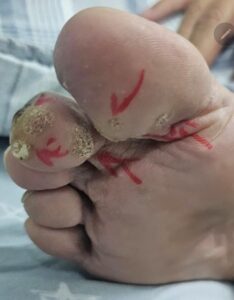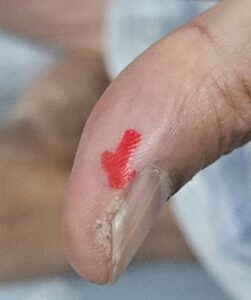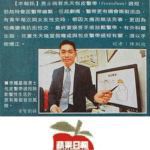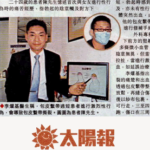What is wart?
Wart is a common skin disease caused by human papillomavirus (HPV) infection. Warts can grow anywhere on the body and most commonly affect children and young adults.

<Foot warts>

<Periungual warts>
Causes of warts
Warts are caused by HPV infection of minor skin wounds, via direct contact. Such contact can happen with walking barefoot in swimming pool, using bare hands to do push-ups in the playground, or using diseased patient's personal contaminated items (e.g., towels, razors). Patients can also spread the wart infection to themselves or their close contacts by touching the diseased area. Those patients with poor health or multiple minor wounds have a greater chance of infection.
Symptoms of warts
Warts can appear in different shapes or sizes. Raised, thick, and rough-surfaced dots can appear on the surface of the skin. Some patients may even see black spots within the dots. The affected area will be painful when pressed, and sometimes bleeding may occur. Some warts are smooth. In most patients, the skin texture at the site of the wart appears deformed.
Wart treatments
A small number of warts (less than few percent) will heal on their own within months or years without treatment. If warts cause discomfort, spread, or affect appearance, the following wart treatments may be considered:
- Chemical Therapy
Chemical therapy (e.g., strong acid, toxins) uses superficially applied chemicals to cause superficial cell death and tissue necrosis. The depth and width of tissue necrosis need to be carefully controlled. Please discuss with your doctor before using chemical methods. - Cryotherapy
Cryotherapy uses liquefied nitrogen spray to produce very low temperature causing frostbite and subsequent superficial tissue necrosis. The depth and the width of tissue necrosis is often difficult to control. It usually requires several courses of treatment to heal. Please discuss with your doctor before using cryotherapy. - Laser Surgical Treatment
Carbon dioxide laser is used to burn, cauterize, and vaporize wart tissue on the skin surface causing immediate tissue destruction. The depth and width of tissue destruction needs to be carefully controlled. Please discuss with your doctor before using laser surgery. - Surgical Excision
Method 1: Excision and Suturing
The skin containing the wart tissue is excised and the wound is sutured together with stitches, usually under local anesthesia or rarely under general anesthesia. Stitches will be taken off in two to three weeks after surgery.
Method 2: Excision and Cauterization
The warts are excised completely. The cut wound edge and base are cauterized, usually under local anesthesia or rarely under general anesthesia. The burned surface is cleaned daily and the wound heals slowly.
Please discuss with your doctor before surgery.
FAQs
Q: How to avoid getting warts?
A: Avoid contact with people with warts and their belongings. Don't share items such as razors, towels, socks and shoes. Avoid walking barefoot in public bathrooms and changing rooms. Keep your feet dry and protect your skin. Injection of HPV vaccine can also prevent warts.
















